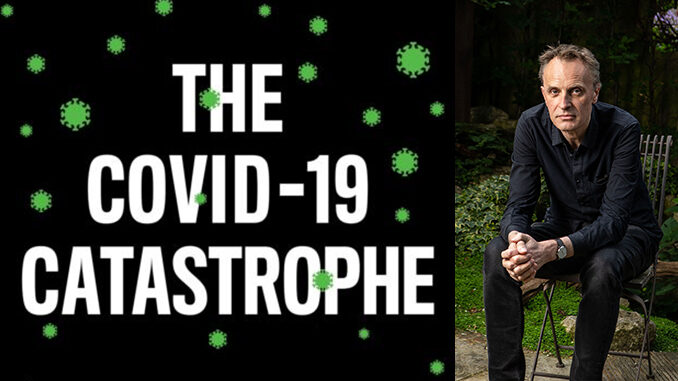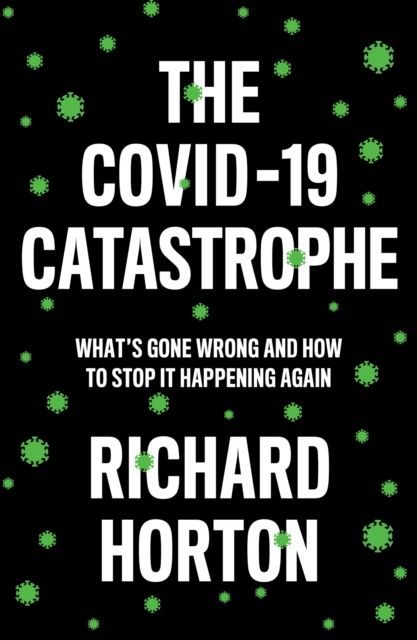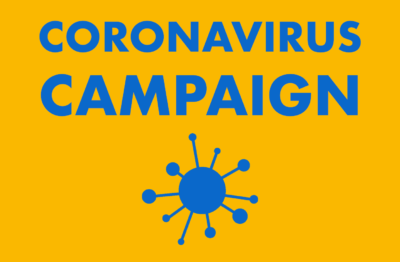
Book review: Richard Horton – ‘The COVID-19 Catastrophe’. Polity Press; Cambridge, 2020
Richard Horton is Editor-in-Chief of the prestigious medical journal The Lancet, first published in 1823. In the preface to issue one, the founding editor Thomas Wakley served notice on the medical profession's pursuit of ignorance, prejudice, and patronage and on the self-interest of its leaders. In his writings on the pandemic, Horton shows himself a worthy successor to Wakley. The book’s subtitle is: ‘What’s gone wrong and to how to stop it happening again’. Horton has plenty of insights into what has gone wrong and provides important suggestions on how further disasters might be averted. In this review, I quote freely from his words.
China learned the right lessons from bitter experience
A key event in the historical timeline is the 2002/3 Severe Acute Respiratory Syndrome outbreak caused by a coronavirus (SARS-CoV-1) that infected 8,096 people and caused 774 deaths across 37 countries. Although the Chinese government was heavily criticised at the time for its handling of the outbreak, ultimately, the rapid containment of SARS worldwide was recognised by the US Institute of Medicine as a global success. It warned, however, that a recurrence would put health systems worldwide under extreme pressure and that continued vigilance was vital. This outbreak was both an international wake up call and the reason why the Chinese government was determined to do much better when COVID-19 (SARS-CoV-2) appeared.
Horton sets out by stating: “Chinese scientists and health workers deserve our gratitude . . . they worked tirelessly to understand the nature of this pandemic. They made it their duty to inform the WHO when they were sure there was reason to signal global alarm . . . I have observed nothing less than an extraordinary commitment to collaborate openly and unconditionally to defeat this disease.”
The Lancet is at the cutting edge of international developments in medical science and published the landmark first clinical description of COVID-19 on 24th January 2020. The Chinese made it clear that national health systems should be urgently scaling up intensive care facilities, building stocks of personal protective equipment (PPE), and preparing for potentially high mortality.
Government inertia
Given these clear warnings, Horton considers the delayed response to COVID-19 in the UK as “the greatest science policy failure for a generation”. He attributes the complacency of our political leaders to the fact that they could not believe a virus originating in an unheard of Chinese city could have such calamitous effects in their own communities. This “appalling lack of political vigilance” was compounded by a decade of austerity, unprecedented decline in the growth of the NHS budget despite rising demand, and a public health system subjected to £1 billion of cuts since 2015. In the US, the spectacular unpreparedness for SARS-CoV-2 was also directly related to cuts in public health and epidemic prevention planning, reflecting a broader antipathy to international interdependence, solidarity and cooperation between nations. This resulted in more people dying in the US from COVID-19 in a three month period than during the entire Vietnam war. As for the US president cutting funding to the WHO in the middle of a pandemic, Horton does not mince his words: “By attacking and weakening WHO while the agency was doing all it could to protect peoples in some of the most vulnerable countries in the world, President Trump has, in my view met the criteria for the act of violence the international community calls a crime against humanity”.
We in the UK were unprepared - fact
In the UK in 2016, Exercise Cygnus had confirmed that pandemic influenza was top of the government’s National Risk Register and that preparedness was ‘currently not sufficient to cope with extreme demands of a severe epidemic’. As one of those involved later remarked: “We learnt what would help, but did not necessarily implement those lessons”. Jeremy Hunt, then Secretary of State for Health, has attempted to absolve himself of any responsibility, but clearly there were many (like Hunt) who knew what might come but then ‘chose third party rather than fully comprehensive insurance’ presumably on grounds of cost.
Why was it that if took the government seven weeks from the last week in January to accept the seriousness of COVID-19 and then wasted the whole of February and March? Horton’s answers include preoccupation with Brexit, but he also notes that in early March, the prime minister had both recognised COVID-19 as a significant challenge and contradicted the conclusion of Exercise Cygnus by claiming that the UK was well prepared. While Johnson demonstrated he did not understand the capability of his country to address the most severe civil emergency risk on the risk register, he advised ‘taking it on the chin and letting it move through the population’, advocating hand washing and boasting about still shaking hands with everyone he met.

Scientists too get it wrong
Meanwhile, scientists advising ministers seemed to believe the new virus was much the same as influenza. One of them (Graham Medley) called for ‘a nice big epidemic’, explaining spread through the population would have the beneficial effect of generating herd immunity. This was echoed by Sir Patrick Vallance, the government’s chief scientific officer, who suggested that the goal was to infect 60% of the UK’s population. With a known death rate in China of 1% among those infected, this would have meant around 400,000 deaths – a figure that should not have been too challenging for top brains to work out. The mistaken belief in the similarity between influenza and SARS-CoV-2 allowed a key government committee to endorse Public Health England’s assessment of the virus as presenting only a ‘moderate risk’. This was a whole three weeks after the WHO’s declaration of a Public Health Emergency of International Concern (the most extraordinary power that a director-general of WHO possesses). Underestimation of risk was instrumental in delay in preparing the NHS for the coming wave of infection, with inadequate supplies of PPE and insufficient numbers of intensive care beds and equipment.
England’s deputy chief medical officer’s description of the UK’s state of preparedness as ‘an international exemplar’ caused astonishment. The truth, as Horton observes, was that: “The UK’s response had been slow, complacent and flat-footed. The country was glaringly unprepared”. He also cites other examples of government misinformation including a denial that a policy of herd immunity was ever pursued; claiming that testing was always a priority; that older people in care homes had a protective ring thrown around them; that risk was not underestimated and lockdown was not delayed. During the ensuing chaos, frequent use of war metaphors (‘We are at war with an invisible killer’) by Matt Hancock and others created an atmosphere where dissent and criticism of government policy was discouraged, and even branded as a kind of betrayal, just as scepticism of the ludicrous operation Moonshot (10 million tests a day) is now being portrayed as disloyal and unpatriotic.
The UK failed to learn lessons
The UK missed opportunities to learn from the experiences of other countries. Horton suggests this was because the regime of science policy-making was corrupted, as evidenced by its failure to act on clear and unambiguous signals from China and then from the WHO. Failing to contact colleagues in China and Hong Kong to obtain first-hand testimony and not discussing with the WHO simply constitutes an abuse of entrusted power. In addition, there was unforgivable collusion between scientists and politicians in order to protect the government and convey the illusion the UK was prepared and made all the right decisions at the right time. “Advisors became the public relations wing of a government that had failed its people”.
The government’s ‘Special Advisory Group for Emergencies’ (SAGE) quickly became known for excessive secrecy and deference to ministers, prompting Sir David King, a former Chief Scientific Advisor, to set up an independent group of scientists. Deliberations by ‘Independent SAGE’ were based on the premise that scientific advice will only be trusted by the public if the scientists are seen to be independent of government. The first meeting set a new standard for scientific policy making, characterised by openness, enthusiasm and a desire to engage with the people. Examples from which government might have learned important lessons but chose to ignore included the rapid building of ‘shelter hospitals’ providing isolation facilities for less ill patients in China; the importance of early aggressive testing and isolation of contacts (Hong Kong); widespread mask wearing; strict border controls; screening travellers entering the country (Taiwan); the importance of coordinated effort and transparency (South Korea); local management of test and trace (Germany); early escalation of risk (New Zealand).
The health service as a line of defence
Horton defines a health service as representing commitments to the empathy and responsibility we feel to one another and standing in opposition to principles of individualism and competition. Willingness to act on behalf of others is a second feature of a health system, manifested by a belief in our interdependence, reciprocal responsibility and collective action. The whole basis of our society rests on these two principles, now sorely challenged by COVID-19. This disease must teach us to re-imagine our security as being about people and communities, about our survival, our livelihoods and our dignity. An effective health service is the most important defence we have to protect that security.
Protecting the vulnerable
Horton regards one of the lasting legacies of COVID-19 as being the silent human destruction wreaked on the most unprotected members of society, with devastation in the social care system taking place without any politician seemingly knowing or understanding what was happening. Members of the BAME community were four times more likely to die than their white counterparts, strongly related to socio-economic disadvantage. Almost two-thirds of health workers who died were from an ethnic minority. Despite the very best efforts of health workers and contrary to what the government would like us to believe, the NHS did not cope. The true death toll in the population at large will also include those with symptoms of life-threatening illness who did not receive the emergency care they needed. Health and care workers were left unprotected through lack of PPE while government ministers insisted on a daily basis that deliveries were being made to wherever needed. According to Horton, these statements turned out at best to be overpromises, and at worst bare-faced lies, and demonstrated the hypocrisy of officials joining in with the weekly ‘clapping for our carers’.
Why did the Royal Colleges and other bodies representing the medical profession not make more noise? The reasons are unclear, but Horton considers that the leadership of medicine in the UK and many other western nations has let down those they were supposed to protect: “It was a grubby betrayal, a stain on the leadership of a profession whose frontline workers had given so much”. Another reason might be that College presidents do not like to rock the boat and often have one eye on their future knighthoods or equivalent rewards for service. As for politicians, he goes on to add that: “The message of gross incompetence is not welcome in Western political, medical or even media circles. It conflicts with a geopolitical narrative that casts China as a negative and destructive influence in international affairs . . . But to blame China and WHO for the global pandemic is to rewrite the history of COVID-19 and to marginalise the failings of Western nations”.
Watch: Richard Horton’s speech to Keep Our NHS Public AGM September 2020
‘The Ghost of Christmas yet to come’
Horton is clear that the pandemic of SARS-CoV-2 will be neither the last nor the worst global health crisis of the present century, and that it is more than a crisis about health – it is a crisis about life itself. He sets out a challenge: “our task is to uncover the biographies of those who have lived and died with COVID-19 . . .to insist on a social and political critique . . . to . . . use understanding not only to change our perspective of the world but also change the world itself”. The risks we face are not just from new virus infections but the regime of science policymaking. In addition, COVID-19 has seen a rebirth of the state which will: “assume an ever-greater role, from reconstructing state-sector economies to expanding social protection, from creating resilient health systems . . . to investing even more generously in science”.
His view is that the virus that caused COVID-19 isn’t going away and that the best we can hope for is peaceful coexistence, while on a positive note, disasters can be catalysts for social and political change. Let us hear from a wider array of voices assessing and judging risks transparently and more critically; health systems will be constructed to be better prepared for coping with a new disease; a redistribution of esteem will recognise and reward key workers; governments will tackle inequality with energy and commitment; countries will work together to strengthen the WHO and for global health security; the determinants of a stable and sustainable society will become matters of utmost importance; policymakers will pay attention to strengthening social capital. Once we have got on top of this pandemic he asks, “can we redefine our values and goals together, can we give priority to our wellbeing over our wealth?” . . . We have to use this time for solidarity, for mutual respect and mutual concern. My health depends on your health. Your health depends on my health . . . . The post-COVID-19 age will usher in a new era of social and political relations”.
Conclusion
Horton has written an impassioned and lucid account to help us understand what has gone wrong and what may be put right. There are important lessons to be learned. If the pandemic is indeed a portal from an old world to a new one, this gives us as campaigners for our NHS a new challenge – how to frame the narrative around a movement to rebuild the NHS in a way that will energise and mobilise the mass of people who have experienced the pandemic at first hand and had their minds opened up to new possibilities. The situation is pressing - forward to a better world or backwards towards barbarism? Let us contribute to the fight by creating an inspiring and inclusive vision in order to ensure that simply because “All changed, changed utterly: A terrible beauty is born.”
John Puntis
Co-chair, Keep Our NHS Public
To read Richard's latest book you can purchase a copy here:







Leave a Reply